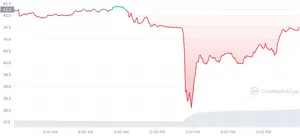Silvergate announced that they would be cutting 40% of their staff — around 200 employees. They also announced that they would be taking a $196 million impairment charge on assets they purchased from Diem — Facebook's blockchain-based payment system once known as Libra. "Given the significant changes in the digital asset industry landscape, this charge reflects the Company’s belief that the launch of a blockchain-based payment solution by Silvergate is no longer imminent," they wrote.
Silvergate's stock plunged 41% on the news.










